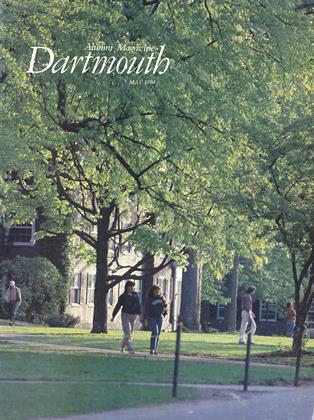The endowed professorship, a long European tradition dating back to the Renaissance, made its first American appearance at Harvard College in the 18th century. The distinction is one of academe's highest honors in that it recognizes outstanding scholarship, usually ensures its holder tenure, and offers him or her the opportunity to pursue scholarly endeavors with fewer of the normal distractions of full-time teaching. In addition, a stipend, though quite modest by industry standards, accompanies the award and is one way colleges and universities have of retaining top-flight professors.
The endowed professorship (or chair, as it is often called) is also a mark of distinction for the granting institution, particularly in a climate of economic uncertainty and fierce competition for the best scholars. Those institutions fortunate to have a number of endowed chairs are always able to compete more effectively in the academic marketplace. Dartmouth has been particularly fortunate in attracting and retaining scholars of compassion, intellect, and ability, and the recent naming of eight teacher/scholars to the rolls of the College's endowed chairs further strengthens the tradition.
Three of the appointments - all made at the Trustees' April meeting and effective July 1 - were to newlycreated chairs. The Signal Companies, a major manufacturer based in La Jolla, Calif., has just made a gift to the Tuck School to endow a chair in accounting and finance. The largest single corporate gift in Dartmouth history, the endowment totals more than $1 million. The first holder of the Signal Companies' Professorship of Management will be Clyde Stickney, a member of the Tuck faculty since 1977 and an authority on the relationship between managerial decisions and financial reporting. The other two new chairs were endowed in connection with the development of the Nelson A. Rockefeller Center for the Social Sciences. Frank Smallwood '51, director of the Rockefeller Center and currently the Orvil Dryfoos Professor of Public Affairs, was named the Nelson A. Rockefeller Professor of Government. William L. Baldwin, a professor of economics who had formerly chaired his department, was named the John French Professor of Economics; French, a New York investor, was Rockefeller's roommate when they were both students at the College in the class of 1930.
Five other appointments were made to endowed chairs. Steven P. Scher, a professor of German and comparative literature and former chairman of the German department, was named the Ted and Helen Geisel Third Century Professor in the Humanities for a term of five years. He succeeds Professor of Music Jon Appleton. The chair, established in the name of Theodor Geisel '25 (better known as the children's author Dr. Seuss) and his late first wife, is designed to encourage new directions in curricular development; Scher has proposed developing interdisciplinary courses in the comparative study of literature and the arts.
Gene Lyons, a government professor, former director of Dartmouth's Public Affairs Center, and former associate dean of the faculty for the social sciences, was named to replace Smallwood in the Dryfoos chair. Jere R. Daniell '55, professor and former chairman of the history department, was named the Class of 1925 Professor to succeed Professor of Government Charles B. McLane '41. James Tatum, professor and chair of the classics department, was named the Aaron Lawrence Professor of Classics; the Trustees also approved a change in the chair's name from Greek to classics. Finally, Alan T. Gaylord, professor and chair of the English department, was named the Henry Winkley Professor of Anglo-Saxon and English Language and Literature. He succeeds Professor of English Harold L. Bond '42, who is going on sabbatical in June prior to retirement in 1985.
 View Full Issue
View Full Issue
More From This Issue
-
 Feature
FeatureFeast and Famine
May 1984 By Laurie Kretchmar '84 -
 Feature
FeatureThe Granite of New Hampshire
May 1984 By Debbie Schupack '84 -
 Feature
Feature"The Highest-Ranking Woman in American History"
May 1984 By Shelby Grantham -
 Cover Story
Cover StoryA Return to Dartmouth
May 1984 By Brian W. Ford '67 -
 Class Notes
Class Notes1959
May 1984 By William G. Long -
 Class Notes
Class Notes1956
May 1984 By Clement B. Malin







